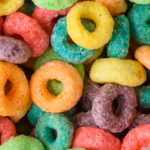As the new school year kicks off, some teachers are already dreading the unruly kids that will be coming back into their classrooms.
Oftentimes, you think your students simply need better behaviour, when in reality, they just need to be fed better nutrients that will fuel their brains in a positive way.
Breakfast is one of the most important meals of the day as it can influence how you and your children feel and perform all day long.
The typical North American breakfast consists of some form of carbs (bagels, cereal, toast, ect.). These refined carbs give you a quick energy and a mood boost by spiking blood sugar (Insulin). However, this will leave you hungry again a couple hours later when you come crashing down from that rush. Increasing cravings for more carbs or sugar to keep you going.
This spike in Insulin first thing in the morning speeds up kids brains and hinders their ability to focus and concentrate at school. It can also lead to weight gain, mood swings and energy highs/lows all day.
Boys specifically, having a lot of sugary foods, lowers their B6 level. This makes them more aggressive and rambunctious.
As a parent, one of the best things you can do for your children is feed them a nutritious breakfast.
Having a breakfast consisting of protein and healthy fats will help to raise Acetylcholine which improves memory, productivity, and focus. While reducing anxious feelings, mood swings and cravings later on in the day.
Eating within an hour of waking helps to lower Cortisol levels and activates the nervous system so kids will feel more calm throughout the day.
Benefits of Protein:
- Improves Insulin and Blood Sugar Levels – Prevents Crashes
- Helps build the Immune System + Reduces hunger levels / cravings
- An important nutrient needed to build muscle, bones & hormones
Benefits of Healthy Fats:
- Helps Regulate Blood Sugar (which helps with learning)
- Improves Hormonal Balance (better mood)
- Improves Mental Focus and Concentration + Skin Conditions
- Reduces Inflammation
Why do we want to avoid processed and high sugar foods at breakfast?
- Gluten & Gliadin damages the small intestine and affects its ability to absorb nutrients from food. This can lead a child to become malnourished (lacking B vitamins for energy & neurotransmitters for memory, mood, focus & concentration)
- Provides a short spike in energy resulting in a crash shortly after & the need for more carbs to sustain energy
- Disrupts Insulin & Blood Sugar Levels which can lead to weight gain
- Can increase ADHD symptoms
- Increases Inflammation
The Issue with Gluten Consumption: The Gut/Brain Connection:
- Gluten causes inflammation which can affect any part of your body. This includes your brain, and can show up as psychiatric or behavioural issues, mood disorders, brain fog or other cognitive/memory issues.
- The brain and gut are connected, so tummy issues often go hand-in-hand with neurological challenges.
- Children that experience digestive problems such as constipation, diarrhoea, nausea, bloating and stomach pains can also experience difficulties with mood, behaviour, memory, concentration and sleep.
- Poor gut health can also increase aggression, headaches, fatigue, depression & anxiety/worry in children.
As you can see, the foods we feed our children (and ourselves) can significantly influence how to feel, focus, learn and behave throughout the day.






